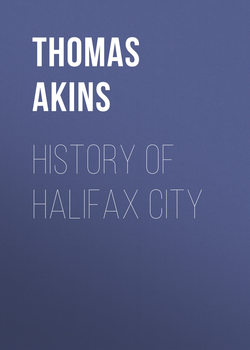History of Halifax City

Реклама. ООО «ЛитРес», ИНН: 7719571260.
Оглавление
Akins Thomas B.. History of Halifax City
CHAPTER I
CHAPTER II
CHAPTER III
CHAPTER IV
CHAPTER V
CHAPTER VI
CHAPTER VII
CHAPTER VIII
CHAPTER IX
APPENDICES
Отрывок из книги
The winter of 1749-50, as has been before mentioned, was spent in continual apprehension of Indian and French invasion, and in preparations to receive the enemy. On the 7th January, 1750, a number of the inhabitants petitioned that Martial Law should be declared, but the Governor and Council did not consider the danger so great or imminent as to make it necessary. However, stringent regulations with regard to the militia were enacted, and an ordinance was issued compelling all settlers able to bear arms between 16 and 60, to be formed into 10 companies of 70 men each,21 and a guard of – officers and 30 men to assemble every evening near the parade to keep guard until sunrise, and all militia men called upon to labour at the fortifications, were to be allowed 1s. per day. Labourers were constantly employed in raising a barricade and continuing it to the water side, and block houses were erected between the forts.
During the winter intelligence frequently arrived from Minas, Pisiquid, and the eastern shore, of attacks being made by the Indians upon stragglers, and several young Acadians were brought from Minas to Halifax for trial, having been found in arms with the Indians. A large reward was offered for the apprehension of LeLoutre, the Indian missionary, and also £10 sterling for every Indian scalp or Indian prisoner. Capt. Sylvanus Cobb, an active and bold sea captain from Massachusetts, was taken into Government employ, and sent to Chignecto with his armed sloop for the purpose of surprising LeLoutre and his gang, and afterwards to search the harbors along the coast for Indians, and bring with him all he captured as prisoners to Halifax. Troops under Capt. Bartilo and others were sent into the interior and other active proceedings taken by the Governor and Council during the months of January and February for the peace of the province. A courier having been stopped at Cobequid, Priest Gourard and the French Deputies, were all brought to Halifax, by Capt. Bartilo, for examination before the Governor and Council; Gourard was detained at Government House until the courier returned, but the deputies were dismissed. He disclosed the fact to the Council that the Mic-Mac Indians of Nova Scotia went every year to Quebec, to receive clothing from the French Government, and that LeCorn had made the French of Acadia take the Oath of Allegiance to the French King. Gourard on this occasion took the Oath of Allegiance to the Crown of Great Britain, and thereupon received a licence to officiate as Priest to the Acadians, and promised not to leave the province without special leave from the Governor.
.....
Roger Hill,
Js. Deschamps,
.....